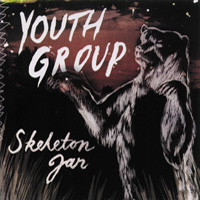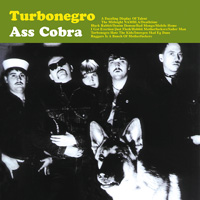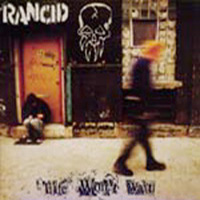 Rancid
Rancid
Life Won’t Wait (Epitaph)
An interview with Tim Armstrong, Matt Freeman, Lars Frederiksen, and Brett Reed, plus Vic Ruggiero from the Slackers, interruptions by Brad Logan from F-Minus and The Wix
by Margo Tiffen
When music and creativity become business, which they inevitably do, do you find it hard to stay close to the fact that at its true heart, it’s meant to inspire, to save and to give? Do you find it hard to separate the craziness of the industry from the fact that music is so powerful that a band, a song, can change or save someone’s life?
Tim: Well, you gotta stay humble and grounded. Humility is a great gift. Try not to let it go to your head. I’ve known all these guys for a long time and when one of us starts to bug out, the other person is there to check ’em and bring ’em back down. There’re no superstars in this band, we’re all on the same level. We all get paid the same, it’s all equal and that’s a pretty healthy place for us to be.
Matt: I think it’s important. There’s a big difference in both aspects of it. I don’t think we ever really gave a fuck about money or success. I think success was always, to us, being able to get some food.
Tim: Not even that, for me, just to make a tape. Success was making a tape. I spent my last five dollars on making a couple tapes.
Matt: Having some money to put up a flyer.
So you basically don’t find yourselves in any position that makes you feel torn between business and creativity?
Tim: You know, we’re in a position of making records at Epitaph, doin’ ’em one at a time. All these bands, man, they owe like seven records to their record label. It’s fucking scary. We don’t have that shit loomin’ over us. If no one buys this record, well alright, we’ll do another one. If Epitaph doesn’t wanna do this record, we’ll go put it out on… um… Lookout!, you know what I mean? That takes a lot of pressure off you, it really does.
Matt: It’s all how much you let it get to you. If you buy into all the fucking bullshit and think you’re like… You know a lot of people always try to fucking kiss your ass or blow a bunch of smoke up your ass, in a way of speaking. If you believe that and stop respecting the craft, stop respecting where you came from, stop respecting the people who buy your records, doin’ all that shit, you’re bound to fucking fail. And that’s when you start fucking up. What Tim said was completely fucking true – we only have one record at a time, and if this one doesn’t do well, who cares? We’ll just do the next one. So that’s the way you do it, you know?
Lars: As long as we’re happy with what we did, that’s the most important thing for us… Two fingers in the air, you know what I mean? Because where we come from, I think we’re all in tune with it, it’s just right around the corner, you know?
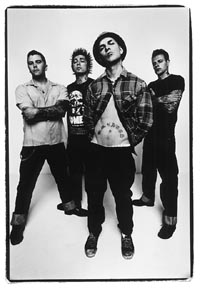 When you started Rancid, do you remember the kind of vision, either musically or aesthetically, that you had for the band?
When you started Rancid, do you remember the kind of vision, either musically or aesthetically, that you had for the band?
Tim: It was actually formed to give me something to do. We started it after I OD’d like three times, in the hospital, I was a mess. So this was basically a way to get me going. Brad, Matt, and me. Once I had a place to live… I was having a hard time keeping it together. My sights were set really low. Just to play some parties, squats in Oakland, or punk rock houses in West Oakland, Gilman Street. We just started telling people, yeah, don’t get your hopes up, it’s not Operation Ivy. We really started out humble, we really did. I had no idea we were gonna sign to Epitaph.
Matt: No, that wasn’t even thought about.
Tim: When Brett heard the demo, he said it was the best thing he’d heard in three years, which was a nice thing to say. We did this thing on Lookout!, but they were more on Green Day’s dick at the time. Lawrence Livermore told me, in retrospect, he wished he’d signed us, but… At the time, they were all about MTV, Green Day bein’ jackassy, you know what I mean? All those bands… I like Green Day, though.
What do you feel like you get from the scene, what do you feel it gives back to you? I know it’s hard to separate, your whole lives are intertwined…
Lars: A place to go, whether it’s a show or a record, you can go there. I think all of us, if we didn’t have a record or a turntable, we’d probably be dead. I think it gives us a sense of belonging, whether it was Black Flag or the Ramones or whoever. Or bein’ at the gig, involved. We got so much from it, you got an identity from it, a family from it, you know what I mean? I think that’s important. For instance, Hellcat Records, that’s like givin’ back to the scene. That’s a perfect instance of like, “thanks, here’s something else, here’s something back… much respect.”
Tim: Yeah, that’s true. Lars produces bands, and Matt was in Auntie Christ, a Lookout! band.
I talked to Exene. She was really on about it, she said “he helped me out so much,” it was so nice…
Matt: That’s nice of her to say.
Lars: I listen to any one of those Hellcat bands and I feel like it’s me in that band, me in that record. If it’s still happening, that’s great. It’s really easy to become jaded, you know, like “I was there before…” you know? “Blah blah, punk rock in ’65.”
Tim: Nah, man. Do you like the Slackers?
Yeah.
Tim: You should interview him a little (points to Vic Ruggiero) ’cause he’s playing with us. Ask him a question, huh? Hey, Vic!
Vic: Yo!
Tim: Come here for a second.
Matt: Hey, Boo Boo!
Vic: What’s up?
Tim: So, uh, we gotta get a quote from you because you’re playing with Rancid.
Vic: What, a quote? A boat?
I meant to ask, you guys are doing something with the Silencers?
Tim: Yeah, me, Vic and Matt are in a band called the Silencers. We tracked like, how many tracks that first day? The first two days?
Matt: Like eight… teen.
Vic: In the first three days, we did like twenty.
Matt: I don’t know, but it was a hell of a lot.
Tim: Yeah, and we’re still kind of looking for a singer for the Silencers. ‘Cause I sing on the track on the Give ‘Em the Boot comp. What we did yesterday is put vocals down for a couple of the songs. Wix sang for one, too. And we split one. We’re going to record all those songs and try to find someone to sing ’em. What’ll probably happen is we’ll end up just keeping what we did and just put that out.
Vic: It would be cool to have a whole bunch of different people do the shit.
Tim: That’s true.
Vic: That would be the shit.
Tim: Well, that’s kind of happening.
Vic: Like the house band.
Tim: We had Mad Lion come in, and he wrote the lyrics to the hard dancehall tune. Like Rancid with Vic, but for the Silencers, like an outtake we never used… I wish I had the tape, but I just gave it away. I have the DAT at my house.
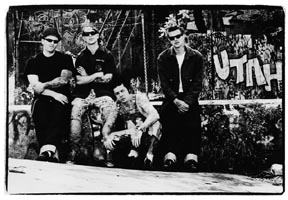 I heard this demo that you did awhile back, before the album. Some of the songs were incredible. I was wondering why you didn’t use them on the Rancid album. A few of the songs off it you did, like “Cash, Culture and Violence,” but you changed it. It was more stripped down on the demo. How come you changed it so much?
I heard this demo that you did awhile back, before the album. Some of the songs were incredible. I was wondering why you didn’t use them on the Rancid album. A few of the songs off it you did, like “Cash, Culture and Violence,” but you changed it. It was more stripped down on the demo. How come you changed it so much?
Tim: Well, we did the demo. This is when I moved down to L.A. and started Hellcat. Vic came out to play on it. “Cash, Culture…” had this real funky Josh Freese beat. We tried to do “Cash, Culture…” kinda like that, but it never really worked, so by the end of the day, we were like, “fuck it.” We just did it the way Rancid would do it. Some day, I might want to release that on Hellcat. The demo sessions.
Vic: Well, those were just demos, right? Demos are like, however they come out, they come out. It wasn’t intended necessarily to be specifically that, right? That’s kind of what I figure.
Tim: Vic’s great at the demos because he can play everything. Lars tried to play bass and Vic played guitar, piano, and percussion.
Matt: “Cash, Culture and Violence” was sort of hard because the song had a vibe to it. We tried to do it, the vibe was there, but I couldn’t really copy it on the bass. I tried several different things, and finally it just turned out the way it did.
Vic: But that bass line you got now is fuckin’ kick ass.
Matt: Yeah, that’s me… angry at you.
Tim: (laughing) So we’re recording “Cash, Culture…” right? And at first, we had the original stuff and Rancid was just kind of playing over it, you follow me? Okay, so Matt’s there. He was so mad ’cause I kept wanting to play Vic’s bass line, and Matt’s a great bass player. Him and Vic are on two different levels, wavelengths… two different artists… Matt was like, he got so mad at Vic that he wouldn’t even say his name. The bass was in the headphones and he was like, “Teach!'” He was the engineer… “Teach! There’s some other guy… Bass! There’s some other guy in my headphones! Take him outta there!”
Matt: If you listen to the track, the one that’s on the record, I’m just like diggin’ into the fucking strings. I mean, I’m definitely like, “I’ll show you how to play it, Mr. Ruggiero!” You know, I’m just like, “dunna-dunna-dunna-dunna, let’s see you try to do this, you fuckin’ hippie!” It was pretty crazy, the track made the record.
Tim: If you listen to it, Vic’s bass tracks, he doesn’t play the same thing twice. It’s cool. Freeman’s more where he gets locked down to something, it’s just solid. Two different styles.
Matt: Vic does more improv shit. I’m sort of like a pit bull when it comes to bass lines. I grab on and don’t let go.
Tim: Vic goes Far East with it, know what I mean?
Vic: Far East, man. But Tim’s tone is a lot different. He likes that real sharp tone.
Matt: Brother, I tried your tone. I tried everything, I couldn’t do it. I almost cried. I was just like, “I CAN’T DO THIS!”
Vic: It’s a different approach. My mom likes your bass playing a lot, by the way. My mom only likes Charles Mingus and Motown – James Jamison bass playing. She don’t like anybody. But she was like, “Yo, Vikta, is dat you playing bass?” I was like, “Naw.”
Matt: (yells) No, it’s not! It’s me! Matt!
Tim: (laughing) She thought it was you playing bass?
Vic: Yeah, on one of the tunes. And I was like “Naw, that’s this guy Matt.” She was like, “Wow. He a very good bass playa. He’s very, very good.”
Matt: That opened my eyes, man. Yeah, I started practicing a lot… On that record, I changed my style a lot. I started playing with my fingers for the first time.
Tim: Yeah, the demo kind of upped the ante. I mean, here I was, hangin’ out with these great New York bands, Vic and all them. It kinda took things to another level for us. That demo kind of launched the whole record, and these guys had to match it. They had to play better than the demo.
Matt: It definitely lit a fire under me, got me going.
What about other people who played on the album?
Tim: Yeah. Dicky Barrett, and Hepcat sang on Life Won’t Wait. Buju Banton, he’s like the king. Man, he’s so talented. The Specials, they were cool, heroes of mine. The Specials were like punk rock, you know what I mean? Vic and I talked about this before. They weren’t really like ska, they weren’t really rocksteady or old school, they were almost like English punk, fast. It wasn’t really ska, they created their own sound. Their own kind of music – Two Tone. The Specials were almost like soul, you know? The bass player played disco bass lines.
Matt: Yeah, he did, actually.
Tim: You know what I mean? Like what the fuck was that? I’d never heard any ska records with like a disco octave. Urn dat urn dat urn dat…
Do you guys want to talk at all about the strong political streak in the record? To me, this record is intensely political. I can’t figure out all the words, but…
Tim: (jumping up) You can’t understand the words?
Naw, some of the words I can’t figure out and you guys didn’t give us lyric sheets.
Tim: You can’t… you can’t hear…
A lot of them I can…
Matt: They’re like the most decipherable vocals…
Yeah, this record is way better than the others. I don’t mind it, but honestly, on some of ’em, I can’t understand all of it. Maybe when I listen to it on headphones it’s better, but…
Lars: That’s the beauty of it – it’s like an old reggae record. You gotta listen to it a hundred times before you can actually understand it.
Tim: Like an old dancehall record. Listen to a B-Man record, tell me what he’s sayin’. You gotta listen to that kid a bunch of times, then you can understand it. All of the sudden, it just hits you.
Each time you listen to it you catch something you didn’t notice before. A lot of it feels really bleak, Armageddon-like. It’s darker than what you’ve previously done.
Tim: It’s the most political record we’ve made.
Do you mind talking about it?
Tim: I’d want some Gatorade.
Matt: Will you grab me a water while you’re over there?
-
- (Tape stops)
(Tape starts again)
Brett: …What came on after Wild Kingdom?
Lars: The Muppet Show.
Matt: Remember Wonderful World of Disney?
Brett: Wonderful World of Disney?
Matt: Yeah, you might be a little young for that, that was back in the ’70s. It was the early ’70s, you weren’t even born yet.
Brett: Naw, I was about one.
Matt: Adam-12 was my favorite. (recites) “Adam-12, One-Adam-12, see the man.”
Tim: What was your question?
I don’t have any questions specifically dealing with that. But you obviously travel a lot, so you’re given the opportunity to be outside looking in at America from a different perspective.
Lars: That does give us a different perspective on world events. I think that helps us out a lot. Maybe it gives us too much perspective.
Brett: I don’t think any of those songs are really preachy politics.
Lars: We’ve always been sort of personal politics…
Brett: Sharing stories of what’s happening around, you decide what you want from them.
Lars: Some of the songs, like “New Dress” or “Warsaw,” have a certain thing to them. Whether it’s about Yugoslavia or sending baseball bats over to Warsaw ’cause they’re trying to teach the Polish kids how to play this American sport, and they ended up taking baseball bats and smashing the shit out of a discotheque. “New Dress” is just more of the whole kind of Western influence. We always seem to get our hands involved into something. It always has to do with religious or ethnic cleansing.
Do you feel that keeping politics in your music helps?
Lars: I just think we do what comes naturally to us. We don’t try to hide it, we don’t try to do it one way or another. I think the way that we go about lyrics is there’s really no right or wrong words. You can talk about it, but I don’t think we get up on the soapbox and say this is right or this is wrong.
Matt: Hey, Bradley, wanna shut the door, man?
Brett: Barnboy.
Lars: We just talk about what affects us, what we see.
Brett: He’s like an ox out of the barn.
Matt: Pushin’ that plow.
Brett: Plowboy!
Brad: Hey, only other plowboys can say that stuff.
This may be a little bit of a reach, but the symbol of the wolf reoccurs in a lot of your songs. In …And Out Come The Wolves, it stems from that Jim Carroll poem…
Brett: What most people don’t know is that I was secretly raised by wolves. No, seriously. I was abandoned as a child and they brought me up. I gotta give props to the wolves ’cause I wouldn’t be here today if it weren’t for them. It seems to come up in the music every time. I don’t know, I don’t write the lyrics, but… The band’s supporting me, being like my surrogate family and being like, “Hey, we’re your wolves, we’ll be your wolves. Put some wolves on the record, we’ll make you feel at home.”
Lars: I gotta clean him every now and then with my tongue.
Matt: There was this deer in my backyard and all of a sudden fucking Brett starts biting its neck, and I’m like, “What are you doing? You’re killing the poor little fucking deer!”
Brett: I think it’s a coincidence that there’s “The Wolf” on this record, and … And Out Come the Wolves on the last one. I think, I don’t know.
Tim: (very serious) It’s a symbol. Of the wicked. Of the nefarious.
Lars: The wolf on the prey.
About using Jim Carroll on the last album, did you sit down and decide that you wanted to use him, or did it just come up?
Tim: Like everything, it was an accident. The whole band is an accident. I’m serious. All this shit’s an accident. Runnin’ into Buju Banton was an accident. We didn’t go down to Jamaica to meet Buju. We ended up at his house…
Matt: We were doing the record in New York. Some vocals, like the last of the record before we did the mix, and lo and behold, Jim Carroll’s doing an interview upstairs, and we went up to meet him. We asked him to sing on the record, and he said yeah. So he comes down after the interview, hears the song once – boom – there’s the lyrics. Goes in, does it, we watch his video premiere on MTV for People Who Died and then he left.
Brett: I think it took place in half an hour.
Tim: Isn’t that weird? He just came down and wrote lyrics, did like one take… whoo – out.
Are you fans of his work? Do you read his poetry? (They all look at me, confused, and suddenly I’m not sure whether they know Jim Carroll’s a poet as well as a musician.)
Tim: I’ll tell you another thing, Buju Banton named this record. Life Won’t Wait, that’s Buju’s line. …And Out Come the Wolves was Jim Carroll’s line.
Matt: So when we first started planning this out, we said, “Okay, by the third record, we’re gonna get guests on it, and whatever they say, we’ll title the record.”
Lars: But I was noticing about the wolf thing too. We had this one song that never made it called “Lycanthropes,” which is the technical term for a werewolf. So it’s kind of like… we’re fascinated.
Matt: It’s one of those weird conspiracy things they’ll write about in ten years like, “Who was the wolf?”
Tim: “Who’s gonna be on the next Rancid record who’s gonna name the record?”
Brett: (affecting an announcer’s voice) “If you’re a guest vocalist on the next Rancid record, you have a shot at the title!”
Tim: “It’s a contest.”
Brett: “Come on down!”
Matt: “Here at KROQ, we’re giving away tickets to the new Rancid record. Be the guest and you can name it!”
I promised someone I’d ask you, what’s your favorite city?
Tim: Kingston, Jamaica.
Someone: I like New York.
Matt: That’s a hard one.
Tim: I like Napoli. Naples, Italy.
Matt: Yeah. I really like New Orleans.
Brett: You like New Orleans?
Matt: I had a lot of fun last time I was there.
Wix: (whispers) Lockport, New York.
Tim: I also like Lockport, New York.
Someone: Wichita.
Matt: I like Boston a lot, except every time I drive there, I get fucking lost. (in Boston accent) “Go down Storrow Drive, make a left, by the dumpsta.”
Someone: Buenos Aires.
Tim: Vic, you must have a favorite city?
Vic: Kansas City.
Tim: Vic likes Kansas City.
Vic: Campbell, that’s where the Ramones are from.
Matt: I like Oakland a lot.
Tim: Elvis Presley’s from Campbell.
Matt: I like Memphis a lot, talking about Elvis.
Tim: What’s your favorite city?
New York.
Lars: Wolvesbain, North Carolina? Wolvesberg, Ohio?
Brett: Salem.

